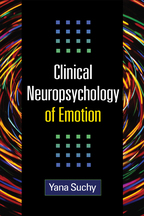Clinical Neuropsychology of Emotion
Yana Suchy
Hardcovere-bookprint + e-book
Hardcover
orderJanuary 20, 2011
ISBN 9781609180720
Price: $75.00370 Pages
Size: 6" x 9"
“Yana Suchy...wade[s] into a realm of clinical neuropsychology theory and practice that has been roundly neglected in this age of cognitive obsession....Suchy's book has a unique Preface that functions as an introduction to the author's thinking about the book along with the aims of the book. It also includes advice in the section How to Read This Book that turns out to be very helpful. Recognizing that readers differ, the author provides instructions that are similar to travel directions that include written instructions and a map. The coverage of the book is quote complete, and most of the disturbances in affective processes that a clinical neuropsychologist is likely to encounter are reported here....The reference material attached to these descriptions of affective phenomena is almost uniformly complete and up to date, reflecting excellent scholarship beyond the 'point and click' ersatz reference product offered by many books....Notably innovative and very much worth reading.”

—PsycCRITIQUES
“A highly engaging and timely integration of emotion theory, research, and clinical application. Recommended for all neuropsychologists and for any clinician who wishes to have a more nuanced understanding of how alterations in the components of emotion give rise to different clinical manifestations.”

—Richard D. Lane, MD, PhD, Department of Psychiatry, University of Arizona College of Medicine
“This book is extraordinary in terms of both its breadth and depth. Suchy has successfully integrated numerous literatures and perspectives into a single, very readable volume. The book will serve as a major text and reference for graduate students in neuropsychology and cognitive neuroscience, researchers examining the brain-emotion interface, and health care professionals evaluating patients who exhibit emotion-processing deficits. It is an engrossing read for anyone interested in age-old questions about the emotional brain. Suchy's superb integrative approach will help transform the neuropsychology of emotion from an interdisciplinary area of research and practice to a truly transdisciplinary one.”

—Meryl A. Butters, PhD, Department of Psychiatry, University of Pittsburgh School of Medicine
“This authoritative and highly readable text makes a substantial and unique contribution to the literature on emotion and personality. Readers will appreciate Suchy’s clarity in espousing a coherent, well-formulated clinical neuropsychology of emotion that is grounded in contemporary theory and practice, yet respectful of historical roots. This thought-provoking volume fills a major gap in the literature. It should be required reading for psychology graduate students and will be a most stimulating desk reference for seasoned educators, researchers, and clinicians.”

—Ida Sue Baron, PhD, ABPP-CN, Director of Neuropsychology, Department of Pediatrics, Inova Fairfax Hospital for Children, Falls Church, Virginia
“This is an invaluable text for undergraduate courses with a focus on emotional processes and the brain. Suchy provides an excellent historical perspective and a clear collation of the current literature. The frequent use of examples and figures makes the information easily accessible. The text is also a unique resource for teaching neuropsychology at the graduate level. It provides a coherent overview of how emotion interacts with personality, cognition, and behavior in a wide variety of psychiatric and neurological disorders.”

—Skye McDonald, PhD, Professor, School of Psychology, University of New South Wales, Australia
—PsycCRITIQUES
“A highly engaging and timely integration of emotion theory, research, and clinical application. Recommended for all neuropsychologists and for any clinician who wishes to have a more nuanced understanding of how alterations in the components of emotion give rise to different clinical manifestations.”
—Richard D. Lane, MD, PhD, Department of Psychiatry, University of Arizona College of Medicine
“This book is extraordinary in terms of both its breadth and depth. Suchy has successfully integrated numerous literatures and perspectives into a single, very readable volume. The book will serve as a major text and reference for graduate students in neuropsychology and cognitive neuroscience, researchers examining the brain-emotion interface, and health care professionals evaluating patients who exhibit emotion-processing deficits. It is an engrossing read for anyone interested in age-old questions about the emotional brain. Suchy's superb integrative approach will help transform the neuropsychology of emotion from an interdisciplinary area of research and practice to a truly transdisciplinary one.”
—Meryl A. Butters, PhD, Department of Psychiatry, University of Pittsburgh School of Medicine
“This authoritative and highly readable text makes a substantial and unique contribution to the literature on emotion and personality. Readers will appreciate Suchy’s clarity in espousing a coherent, well-formulated clinical neuropsychology of emotion that is grounded in contemporary theory and practice, yet respectful of historical roots. This thought-provoking volume fills a major gap in the literature. It should be required reading for psychology graduate students and will be a most stimulating desk reference for seasoned educators, researchers, and clinicians.”
—Ida Sue Baron, PhD, ABPP-CN, Director of Neuropsychology, Department of Pediatrics, Inova Fairfax Hospital for Children, Falls Church, Virginia
“This is an invaluable text for undergraduate courses with a focus on emotional processes and the brain. Suchy provides an excellent historical perspective and a clear collation of the current literature. The frequent use of examples and figures makes the information easily accessible. The text is also a unique resource for teaching neuropsychology at the graduate level. It provides a coherent overview of how emotion interacts with personality, cognition, and behavior in a wide variety of psychiatric and neurological disorders.”
—Skye McDonald, PhD, Professor, School of Psychology, University of New South Wales, Australia



